News
How Republicans and Democrats differ . . . on the golf course
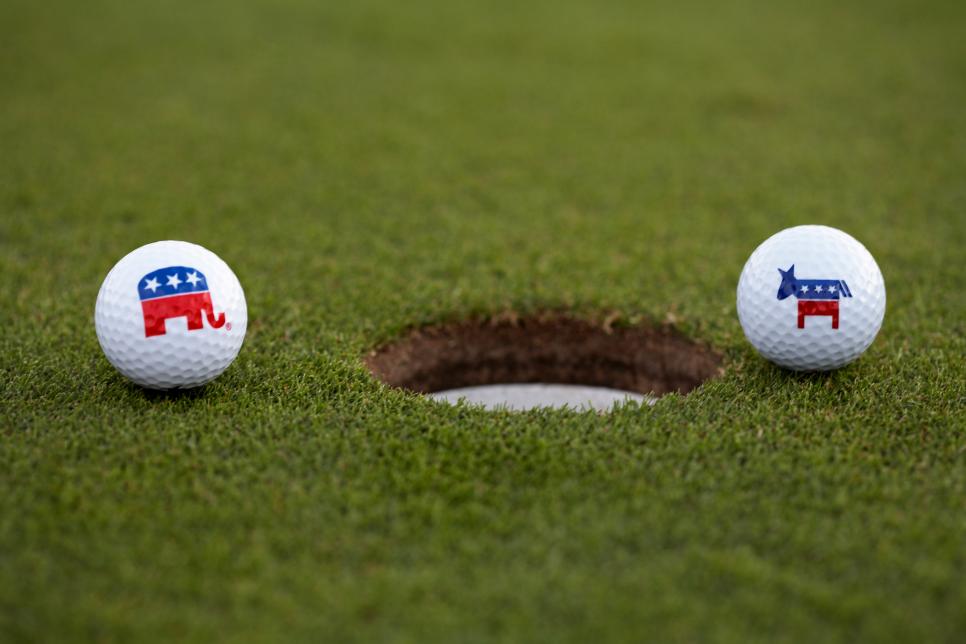
Getty Images
Editor's Note: This story first ran prior to the 2016 presidential election.
We like to think of the golf course as a safe haven from political bickering. Sure, you might touch on the economy during a wait on the tee box, but golf itself is politically agnostic. Your weekend foursome could include people with completely different ideologies than your own and it should have no bearing on how you enjoy the game together.
Sounds great. But is that really true?
To understand how one’s political views might shape them as golfers, we conducted a survey of more than 1,000 regular players asking about a variety of topics relevant in the game -- whether they walk or ride, whether they play golf for money, that sort of thing. We only asked one directly political question -- whether the respondent was a Democrat or a Republican -- but from that, were able to see contrasts in how members of the opposing parties answered the other questions.
In fact, what the survey underscored is how often one’s political leanings can be manifested in a golf setting (we’re not talking about whether you’re chronic miss is to the left or the right). And when you map the survey answers against generally acknowledged differences between the two parties, the results start to follow a trend.
“It’s a super interesting set of findings,” said Chadly Stern, Ph.D., an assistant professor of psychology at the University of Illinois at Urbana-Champaign who has studied and written about how one’s political ideology shapes the way they see the world. “It’s very consistent with what we know about the psychological differences between liberals and conservatives, or Democrats and Republicans.”
We should start with an important reminder -- that this was a survey of mostly avid golfers, a relatively homogenous group compared to, say, people who like music. And on some topics golfers were aligned regardless of how they voted. But most interesting is where the two parties diverge. For instance, Professor Stern was intrigued by Republicans being more inclined to follow the Rules of Golf to the letter. In his eyes, it was reflective of a conservative inclination toward structure. Taking it a step further, he could even explain why people who follow golf rules more closely would also be drawn to the candidacy of Donald Trump.
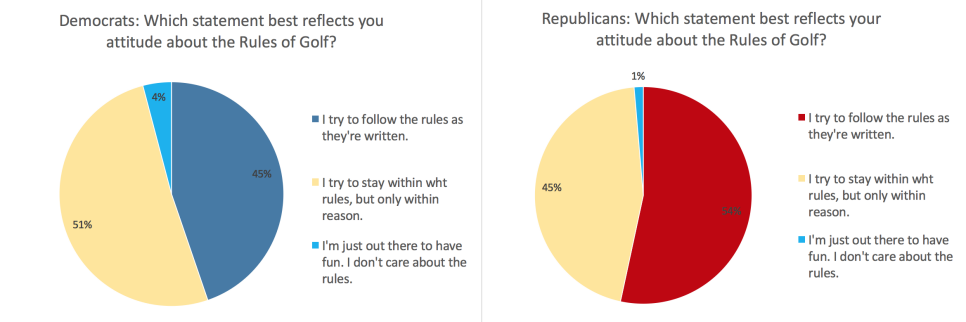
“Among conservatives there’s a tendency to gravitate toward norms and rules, because rules present structure,” Stern said. “One of the things that people have been talking about is that Trump says America is in chaos and there’s a lot of violence and instability and he’s going to make America great and safe again through the enforcement of rules.”
A conservative partiality toward following rules and norms also explains other contrasts. Democrats had less of a problem with golfers smoking marijuana on the golf course, and while mostly opposed to golfers wearing jeans on the golf course, they were more open than their counterparts across the aisle. The gap was even wider on whether denim should be permissible in a golf clubhouse.
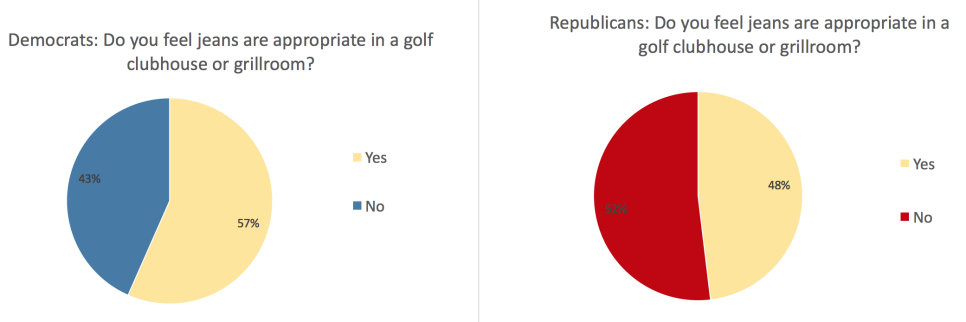
“In a conservative view, the clubhouse is the space where there are norms and where people have to wear certain attire,” Stern said. “It’s clearly distinguishable between the people who have status and the people who don’t.”
The temptation is to think the Republicans tended to veer toward tradition and the Democrats the other way. But not always. Republicans were slightly more lax in their views of smartphone use on the golf course. And they proved to be more open to playing music on the course.
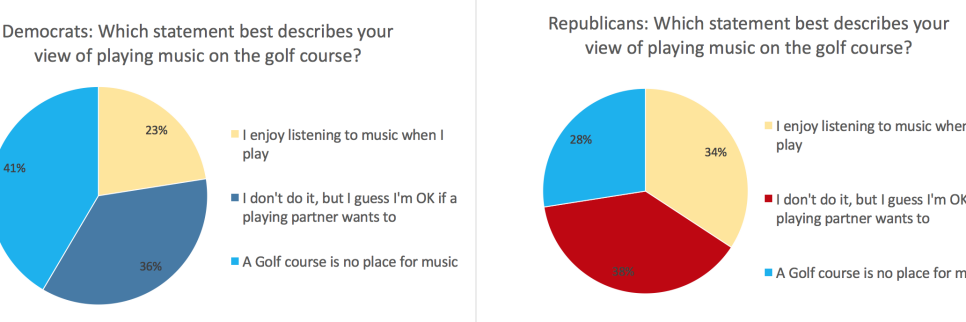
Then there was the question of whether golfers prefer to walk or ride. You might think more Republicans would favor walking since that’s the more traditional form of golf. But here Republicans were far more likely to take a cart -- a reflection, Stern theorizes, to Democrats generally being more eco-friendly.
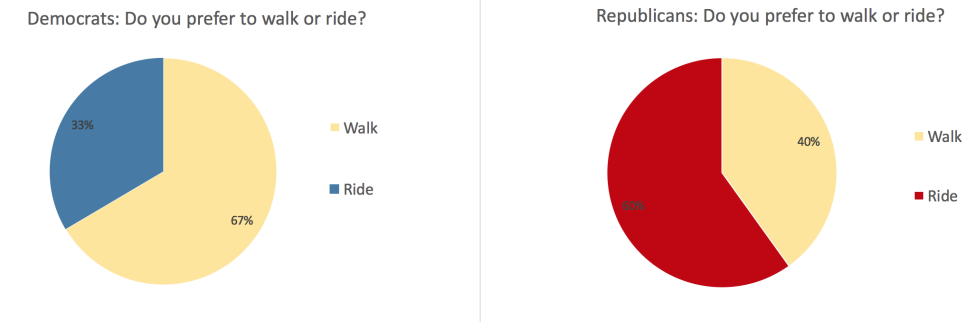
“That was my initial impression, is that liberals tend to be more concerned about the possibility of climate change,” Stern said. “In general, liberals are more likely to ride their bikes than take cars, and that coalesces with what we see here.”
The issue of exclusivity at clubs also crystallized differing ideologies, on a couple of levels. That Democrats were more staunchly opposed to all-male clubs spoke to a willingness to disrupt the status quo, not to mention a party that is more attuned to matters around equality. Meanwhile, 71 percent of Republicans responded that “a private club can do whatever the hell it wants,” which could represent a conservative aversion to outside agencies meddling in someone else’s business.
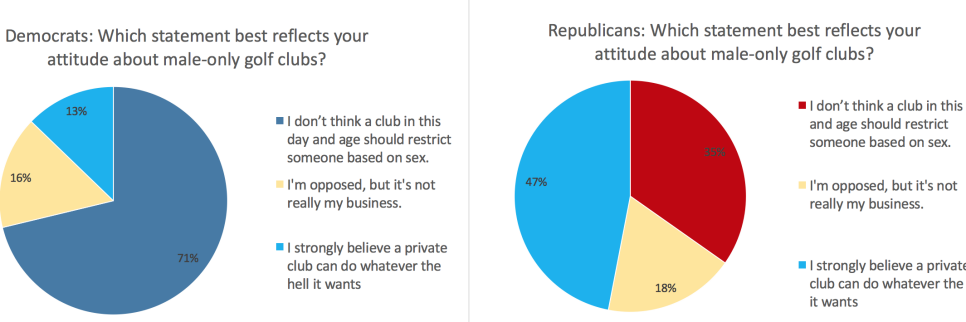
“There are so many examples where Republicans will cite state’s rights, or a local municipality’s rights, or in this case, the rights of an independent club,” Stern said.
As stark as some of the contrasts were between the parties, it's worth reminding they did not disagree on everything. For instance, our respondents all confessed to watching a lot of golf on TV; they were partial toward Nick Faldo over Johnny Miller as analysts; and they have comparable attitudes about drinking alcohol on the course (roughly 76 percent of both groups say they drink at least occasionally while playing).
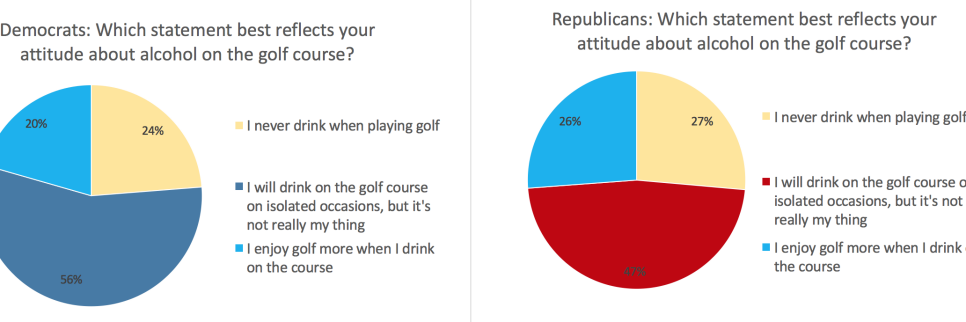
The two groups also play a similar amount of golf (97 percent of respondents on both side say they play at least five times a year) and there was a similar breakdown between those players who had official USGA handicaps and those who didn’t.
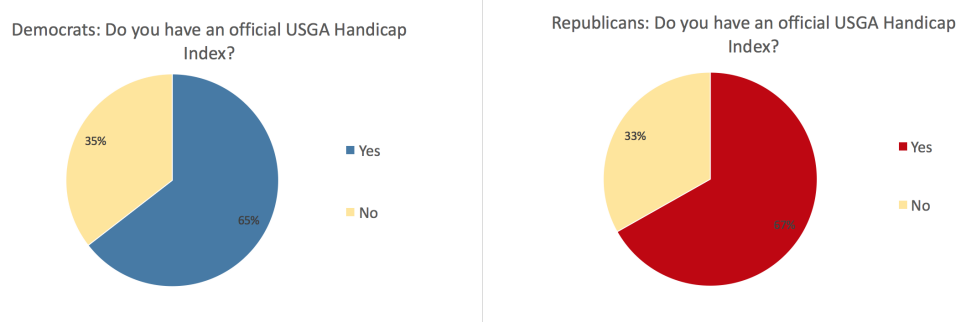
In this era of political division, we’re not saying you can’t play with a member of the opposite party. In the spirit of bipartisanship, you should. But if you find yourself disagreeing on some petty matter on the course, it could be rooted deeper than you think.